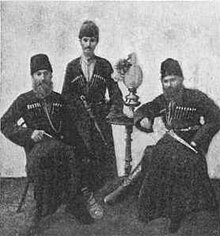джуһур Cuhuro | |
|---|---|
 | |
| Total population | |
| 2004: 150,000–270,000 (estimated) 1970: 50,000–53,000 1959: 42,000–44,000 (estimated) 1941: 35,000 1926: 26,000 [1](estimated) 1897: 31,000 | |
| Regions with significant populations | |
| 100,000–140,000 | |
| 22,000–50,000 [2] | |
| 10,000–40,000[3] | |
| 2,000 (2020)[4] | |
| 266 (2021)[5] | |
| 220 (2012)[6] | |
| Languages | |
| Hebrew, Judeo-Tat (Juhuri), Russian, Azerbaijani | |
| Religion | |
| Judaism | |
| Related ethnic groups | |
| Persian Jews, Georgian Jews, Bukharan Jews, Mizrahi Jews, Soviet Jews, other Jewish ethnic divisions | |
| Part of a series on |
| Jews and Judaism |
|---|
Mountain Jews[a] are the Mizrahi Jewish subgroup of the eastern and northern Caucasus, mainly Azerbaijan, and various republics in the Russian Federation: Chechnya, Ingushetia, Dagestan, Karachay-Cherkessia, and Kabardino-Balkaria, and are a branch of Persian Jewry.[8][9] Mountain Jews took shape as a community after Qajar Iran ceded the areas in which they lived to the Russian Empire as part of the Treaty of Gulistan of 1813.[10]
The forerunners of the Mountain Jewish community have inhabited Ancient Persia since the 5th century BCE. The language spoken by Mountain Jews, called Judeo-Tat, is an ancient Southwest Iranian language which integrates many elements of Ancient Hebrew.[11]
It is believed that Mountain Jews in Persia, as early as the 8th century BCE, continued to migrate east; settling in mountainous areas of the Caucasus. Mountain Jews survived numerous historical vicissitudes by settling in extremely remote and mountainous areas. They were known to be accomplished warriors and horseback riders.[12]
Mountain Jews are distinct from Georgian Jews of the Caucasus Mountains. The two groups are culturally differentiated: they speak different languages and have many differences in customs and culture.[13]
- ^ "The Red Book of the Peoples of the Russian Empire". www.eki.ee. Archived from the original on 2 December 2009. Retrieved 20 September 2017.
- ^ Gancman, Lee. "A glimpse into Azerbaijan's hidden all-Jewish town". www.timesofisrael.com.
- ^ Habib Borjian and Daniel Kaufman, “Juhuri: from the Caucasus to New York City”, Special Issue: Middle Eastern Languages in Diasporic USA communities, in International Journal of Sociology of Language, issue edited by Maryam Borjian and Charles Häberl, issue 237, 2016, pp. 51-74. [1].
- ^ Shragge, Ben. "Canada's Mountain Jews". Hamilton Jewish News.
- ^ "All-Russian population census 2020". rosstat.gov.ru. Retrieved January 16, 2023.
- ^ "In Wien leben rund 220 kaukasische Juden" (in German).
- ^ Brook, Kevin Alan (2006). The Jews of Khazaria (2 ed.). Rowman & Littlefield Publishers, Inc. p. 223. ISBN 978-1442203020.
The traditional language of the Mountain Jews, is part of the Iranian language family and contains many Hebrew elements. In Juhuri, they call themselves Juhuri (Derbent dialect) or Juwuri (Kuba dialect), and in Russian they are known as Gorskie Yevrey.
- ^ Brook, Kevin Alan (2006). The Jews of Khazaria (2 ed.). Rowman & Littlefield Publishers, Inc. p. 223. ISBN 978-1442203020.
The traditional language of the Mountain Jews, Juhuri, is part of the Iranian language family and contains many Hebrew elements. (...) In reality, the Mountain Jews primarily descend from Persian Jews who came to the Caucasus during the fifth and sixth centuries.
- ^ "Mountain Jews - Tablet Magazine – Jewish News and Politics, Jewish Arts and Culture, Jewish Life and Religion". Tablet Magazine. 26 August 2010. Retrieved 2015-12-27.
- ^ Shapira, Dan D.Y. (2010). "Caucasus (Mountain Jews)". In Norman A. Stillman (ed.). Encyclopedia of Jews in the Islamic World. Brill Online.
The Mountain Jews are an Iranian-speaking community that took shape in the eastern and northern Caucasus after the areas in which they lived were annexed by Russia from Qajar Iran in 1812 and 1813.
- ^ "Mountain Jews: customs and daily life in the Caucasus, Leʼah Miḳdash-Shema", Liya Mikdash-Shamailov, Muzeʼon Yiśraʼel (Jerusalem), UPNE, 2002, page 17
- ^ Goluboff, Sascha (Mar 6, 2012). Jewish Russians: Upheavals in a Moscow Synagogue. University of Pennsylvania. p. 125. ISBN 978-0812202038.
- ^ Mountain Jews: customs and daily life in the Caucasus, Leʼah Miḳdash-Shemaʻʼilov, Liya Mikdash-Shamailov, Muzeʼon Yiśraʼel (Jerusalem), UPNE, 2002, page 9
Cite error: There are <ref group=lower-alpha> tags or {{efn}} templates on this page, but the references will not show without a {{reflist|group=lower-alpha}} template or {{notelist}} template (see the help page).